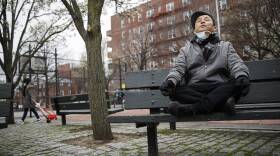EXPLORE MORE
Coming up Wednesday on BPR, live from the BPL:
Historian Doris Kearns Goodwin
National security expert Juliette Kayyem
NAACP’s Michael Curry
Food policy expert Corby Kummer
Recent segments
-
Mental Health During COVID-19
The pandemic's unknowns are anxiety-provoking, and social distancing regulations don't help, says Dr. Ken Duckworth. -
Bob Thompson Remembers Comedian Jerry Stiller
The comedian of "Seinfeld" fame passed away Monday at age 92. -
On The Front Lines Of COVID-19: What It's Like In The Intensive Care Unit
"A lot of these patients were healthy, these were healthy people living their lives," one critical care doctor said. -
Iris Krasnow Talks 'Camp Girls' And The Lasting Impact of Her Time At Camp Agawak
The New York Times bestselling author has a new memoir about the identity-shaping experiences of her time at a summer camp in Wisconsin. -
Shirley Leung: Golf Courses Should Have Received More Notice Before Reopening
The Boston Globe columnist said businesses deserve more notice to ensure they can reopen safely. -
Callie Crossley: The Murder Of Ahmaud Arbery
Crossley speaks about the death of Arbery, who would have turned 26 years old Friday.
Listen to previous shows
-

Oh Deer! Is Venison the Most Eco-Friendly Food?
That deer in your garden? It might just be the most eco-friendly dinner to eat — provided you kill it yourself. Award-winning food writer Corby Kummer joined Boston Public Radio on Thursday to discuss Washington Post columnist Tamar Haspell’s proposal that venison is “unequivocally the single most ecologically friendly food you can eat.” “If you get farm-raised venison in a restaurant, it’s not really addressing this [environmental] issue, because the only thing that’s legal to sell is farm-raised venison,” Kummer said. “You have to go out and kill it.” Haspell argued that due to invasive deer populations posing threats to native animals and plants, the spread of Lyme disease by deer ticks, and the greenhouse gas emissions deer produce, wild venison could be considered the most eco-friendly food to consume. In her piece, Haspell noted that a Connecticut town reversed its no-hunting ordinance in 2000 after being overrun by deer. Scientists who monitored the situation found that in the seven following years, deer density dropped by 87%, and Lyme disease cases in the community dropped as well. “The minute I see cute deer in a backyard — which we do a lot in Jamaica Plain — I think, ‘ticks! Lyme disease!’” Kummer joked. “So there are a lot of advantages to thinning deer [populations].” Both Haspell and Kummer believe, however, that some people will refuse to hunt and eat wild venison despite its eco-friendliness. “As the Haspell column in the Post makes clear, the farther you are from the animal, the more comfortable you are eating it,” Kummer said. “The closer you are, and you see that it’s cute — or if you ever name an animal that you raise, there is a shibboleth against things that you see. So there’s absolutely no problem with inhumanely-raised slaughtered chickens, but when it comes to a deer that’s invading your garden and giving you Lyme disease, ‘no, no, no — don’t do it.’” Kummer is the executive director of the Food and Society policy program at the Aspen Institute, a senior editor at The Atlantic and a senior lecturer at the Tufts Friedman School of Nutrition Science and Policy. -

BPR Full Show: Annissa Essaibi George Says She's the One For the Job
Today on Boston Public Radio: Chuck Todd talks all things politics, including Democratic efforts to avoid a government shutdown, and what it would mean for the country if the United States defaults on its debt. Todd is the moderator of “Meet the Press,” host of “Meet the Press Daily” on MSNBC and the political director for NBC News. Then, we asked listeners how they were coping with the turbulent start of the school year amid the pandemic. Andrea Cabral discusses gun manufacturer Smith & Wesson’s decision to relocate from Springfield to Tennessee, and the rise of the Proud Boys during the Trump era. Cabral is the former Suffolk County sheriff and the former Massachusetts secretary of public safety. She is currently the CEO of the cannabis company Ascend. City Councilor Annissa Essaibi George shares her views on policing and how she would work to solve the addiction crisis at Mass. and Cass. She also responds to a controversy surrounding a conflict of interest between her position on City Council and her husband’s work in real estate development. Essaibi George is Boston City Councilor At Large and a candidate for Boston mayor. Corby Kummer weighs in on the state of restaurants, including staff struggles to make sure patrons wear masks, and one restaurant owner’s decision to raise wages to keep staff. He also talks about how eating venison can help the planet. Kummer is the executive director of the Food and Society policy program at the Aspen Institute, a senior editor at The Atlantic and a senior lecturer at the Tufts Friedman School of Nutrition Science and Policy. Bill Walczak talks about ideas for boosting voter turnout, following a dismal showing in Boston’s preliminary mayoral election. Walczak is the former president and CEO of Codman Square Health Center. He was a candidate for mayor of Boston in 2013. Then, we talk with listeners about how they’re managing phone addiction. -

BPR Full Show: For the Love of Coffee
Today on Boston Public Radio: Art Caplan weighs in on the role of vaccine mandates, and the quick spread of vaccine misinformation on social media. Caplan is the Drs. William F. and Virginia Connolly Mitty Professor and founding head of the Division of Medical Ethics at NYU School of Medicine in New York City. Then, we asked listeners about their experiences with the MBTA following a slew of recent derailments and other accidents. Juliette Kayyem updates listeners on all things national security, including updates on trials of those involved in the Jan. 6 riots, which have been slowed down due to an abundance of evidence. Kayyem is an analyst for CNN, former assistant secretary at the Department of Homeland Security and faculty chair of the homeland security program at Harvard University’s Kennedy School of Government. Jamarhl Crawford and Tanisha Sullivan criticize a lagging timeline and lack of transparency regarding efforts for police reform, and discuss the need to put reform at the top of the agenda in the mayoral race. Crawford is an activist, community organizer and Editor of The Blackstonian. Sullivan is an attorney and the President of NAACP Boston Branch. They are both members of the Boston Police Reform Task Force. Brian McGrory talks about the impact of The Boston Globe’s Spotlight team, how the Globe is covering the mayoral race and Tom Brady’s upcoming return to Gillette Stadium Sunday. McGrory is the editor-in-chief of the Boston Globe. Jared Bowen previews latest art exhibits, including the Titian exhibit at the Isabella Stewart Gardner Museum, the Frida Kahlo exhibit at Brandeis’ Rose Art Museum and Mariano Rodríguez’s exhibit at Boston College’s McMullen Museum of Modern Art. Bowen is GBH’s Executive Arts Editor and host of the TV series Open Studio. Then, we ask listeners what they love (or hate) about coffee in honor of today’s National Coffee Day. -

BPR Full Show: Tom Brady's Homecoming
Today on Boston Public Radio: We start the show by asking listeners their thoughts on vaccine mandates and people threatening to quit their jobs before getting the shot. Trenni Kusnierek updates listeners on all things sports, including rifts in the NBA over vaccines and Tom Brady’s return to Gillette Stadium. Kusnierek is an anchor and reporter for NBC Sports Boston, as well as a Boston Public Radio contributor. Dr. Renee Crichlow calls out remaining healthcare workers who are not yet vaccinated, and talks about latest data on vaccine efficacy months after vaccination. Crichlow is the Chief Medical Officer at Codman Square Health Center and the Vice Chair of Health Equity at the Boston University Department of Family Medicine. Bill McKibben discusses what it would mean for the plant if President Joe Biden fails to pass his economic agenda, and previews his new project, Third Act, which seeks to engage older individuals with climate activism. McKibben is co-founder of 350.org and the author of numerous books about climate change. His latest book is “Falter: Has the Human Game Begun to Play Itself Out?” Nia Grace opens up about her newest restaurant at Northeastern, The Underground Café, and talks about the challenges of keeping restaurants afloat during the pandemic. Grace is the owner and operator of Darryl’s Corner Bar and Kitchen in the South End, and one of the founders of the Boston Black Hospitality Coalition. She is also the owner of The Underground Café and Lounge, which opened last week on the campus of Northeastern University. John King goes through top political headlines, including Republican threats to Biden’s economic agenda and persisting allegiances to Donald Trump. King is CNN's Chief National Correspondent and anchor of "Inside Politics,” which airs weekdays and Sunday mornings at 8 a.m. We end the show by asking listeners about their thoughts on Tom Brady’s upcoming return to Boston Sunday night. -

BPR Full Show: Holiday Shopping Came Early This Year
Today on Boston Public Radio: EJ Dionne weighs in on whether he thinks the Democrats will pass President Joe Biden’s economic agenda, and what it would mean for the party if they fail. He also talks about his visits to mayoral race victory parties and his thoughts on the race. Dionne is a columnist for The Washington Post and a senior fellow at The Brookings Institution. His latest book is "Code Red: How Progressives And Moderates Can Unite To Save Our Country." Then, we talk with listeners about their thoughts on Biden’s economic agenda. Charlie Sennott discusses President Joe Biden’s decision to deport Haitian migrants, Angela Merkel stepping down as Chancellor and the results of Germany’s latest election. Sennott is a GBH News analyst and the founder and CEO of The GroundTruth Project. Chris Burrell unpacks his latest reporting for the Color of Public Money series, which showed that out of a $4.8 billion budget, Massachusetts spent less than $25 million in contracts with Black and Hispanic-owned businesses. Burrell is an investigative reporter covering criminal justice, housing, immigration and other topics for The GBH News Center for Investigative Reporting. Revs. Irene Monroe and Emmett G. Price III talk about a recent slew of racist incidents, including at UMass Amherst and the Roxbury Prep-Georgetown football game. Monroe is a syndicated religion columnist, the Boston voice for Detour’s African American Heritage Trail and a visiting researcher in the Religion and Conflict Transformation Program at the Boston University School of Theology. Price is the founding pastor of Community of Love Christian Fellowship in Allston. Together, they host GBH’s All Rev’d Up podcast. Richard Blanco read poems in honor of Hispanic Heritage Month, including his poem “Looking for the Gulf Motel,” and Caridad Moro-Gronlier’s poem “Analfabeta.” Blanco is the fifth inaugural poet in U.S. history. His latest book, "How To Love A Country," deals with various socio-political issues that shadow America. We end the show by asking listeners how they are planning around warnings of supply chain shortages impacting the holiday season.








